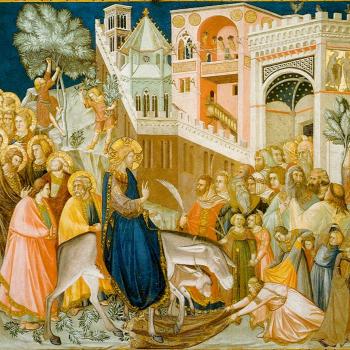The 20th-century philosopher Paul Ricoeur called attention to a phenomenon he called "second naiveté," referring to the way that modern people return to ancient myths and see them not with the credulous eyes of a child, but with the canny understanding that they betray truths deeper than meets the eye. (See a good summary here.) While there is room for discussion about the implications of this idea—not the least of which is the hermeneutical question of how one distinguishes the various literary genres in the Bible—I want to employ his idea in considering the creedal claim that Christ suffered death and was buried.
Orthodox Christian theology has held that Christ's death (and later, resurrection) is not to be understood in a metaphorical sense, but in a quite literal one. To be sure, the evangelists take great pains in their detailed passion stories to explain that his suffering and death were real. Contra the docetist heresy, the evangelists and other disciples mourned the painful death of their beloved teacher, the one whom they had come to believe was God in human flesh.
Second naiveté, then, allows us to see something very strange going on here. God "went there." God was born. God died.
God died.
John Donne, the great English metaphysical poet of the 17th century, intuited something of the strangeness and wonder of that statement. Unlike most of us, who tend to look at death from the "inside," that is, as people who will experience it, like sheep heading in a line toward a slaughterhouse, Donne looked at death from a God's-eye view.
Death be not proud, though some have called thee
Mighty and dreadfull, for, thou are not so,
For, those, whom thou think'st, thou dost overthrow,
Die not, poore death, nor yet canst thou kill me.
...
Thou are slave to Fate, Chance, kings, and desperate men,
And dost with poyson, warre, and sicknesse dwell,
And poppie, or charmes can make us sleepe as well,
And better then they stroake; why swell'st thou then;
One short sleepe past, wee wake eternally,
And death shall be no more; death, thou shalt die.
Donne recognizes that all people fear death and regard it as something dreadful. "Don't do that—you'll die!" is the direst warning a parent can give a child who is reaching toward the electric socket with a fork. Death is the ultimate boundary, the ultimate line demarcating human life. Yet Donne also recognizes that there is something almost comical about death and the various ways that it can come about, through poison or war or sickness. (Edward Gorey's Gashlycrumb Tinies, about children who die in strange ways, also comes to mind.) Death happens.
Donne's poem is profoundly Christian. And yet in its meditation on death it is reminiscent of pre-Christian Greek, Roman, and Near Eastern mythologies, which often focus on the geographic boundaries between the earth and the underworld. Characters such as Orpheus, Odysseus, Aeneas, Osiris, Ishtar, Gilgamesh, and many others descend to the underworld to meet loved ones. These stories betray a deep hope that perhaps the boundary that is death might be permeable, that the unrequited hopes of life might not be the end of our stories.
Religious faiths of many cultures have regarded death as but a passage, a movement. A distinctive element of Christianity is that it does not treat death as an abstraction, as if to say, "trust me, there's more after you die." Instead, Jesus goes there. He suffers. He dies. He gets buried in a tomb. He shows us that death is nothing to be afraid of.
John Donne understood the import of Jesus' death: it liberates us from the ultimate fear. Those who no longer fear death no longer fear suffering. They can plunge headlong into ridiculous actions, like handing over their lives to serve victims of every form of plague. (Examples here, here, here, here, here, and here. Plenty of others.) They can serve the poor with abandon (here, here, here, here, here, and more). They become absurdly unconcerned with small pleasures—those that our bodies give us.
Victor Frankl, the psychotherapist who survived the Holocaust and wrote one of the most important books of the 20th century, Man's Search for Meaning, observed that in the concentration camps those who gave up hope turned to physical pleasures shortly before they died. For those people for whom death is the ultimate boundary, what else is there besides pleasure? Jesus' death—God's own death—suggests that there is much more.
12/2/2022 9:05:40 PM





